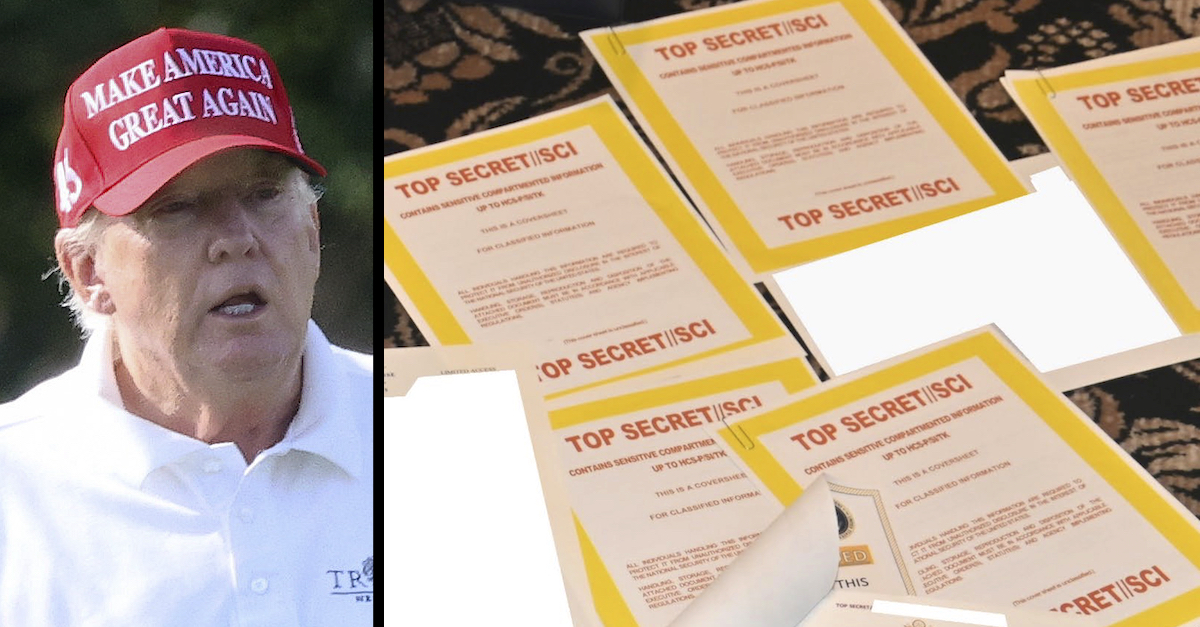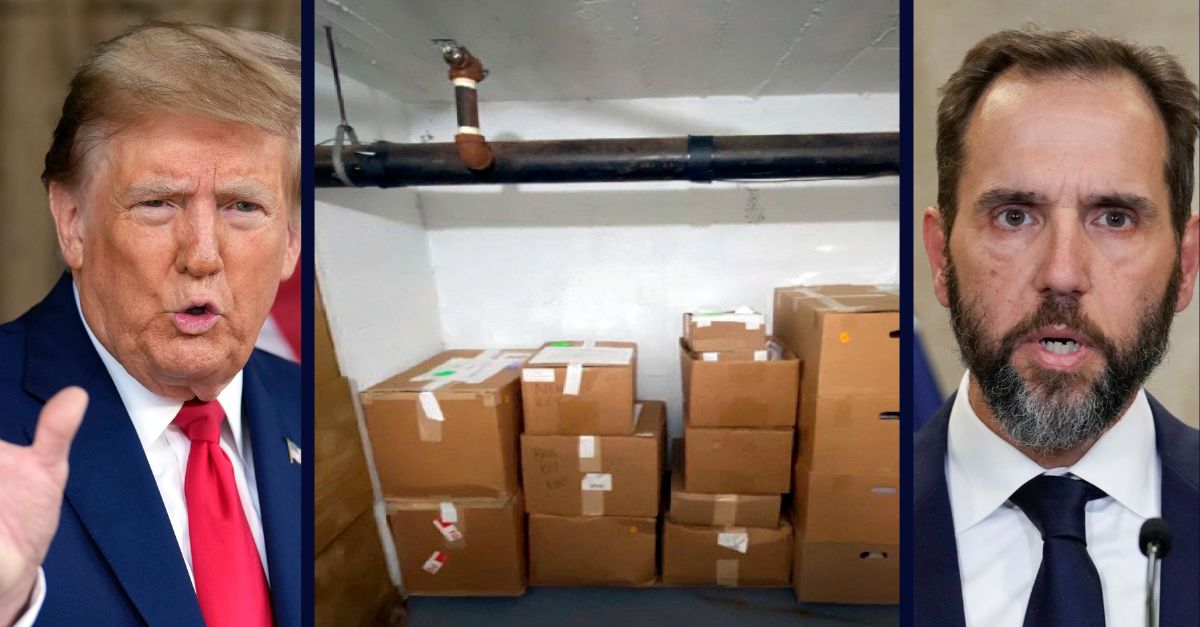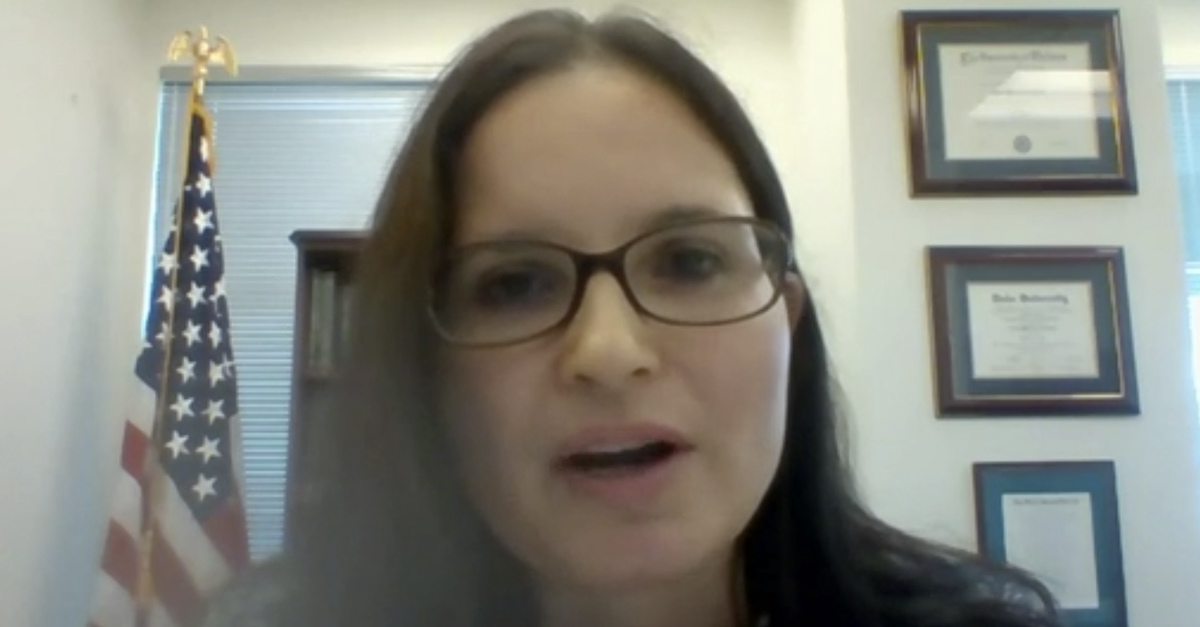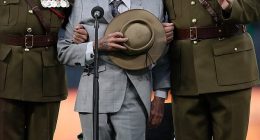
Former U.S. President Donald Trump out golfing on Sept. 13, 2022 (Win McNamee/Getty Images); Federal prosecutors filed a photo of documents recovered from Mar-a-Lago in early August 2022. (Mar-a-Lago documents photo via a federal court filing.)
As expected, special counsel Jack Smith on Monday filed a lengthy rebuttal of defendant Donald Trump’s claims that his Espionage Act prosecution should disappear on grounds that federal investigators did not preserve allegedly classified documents in the exact order in which they were found in boxes at Mar-a-Lago.
The 33-page response to the former president’s evidence spoliation-focused motion to dismiss is a bit of a trip down memory lane, highlighting Trump’s shifting defense strategy and comparing those tactics to his “newly invented explanations.”
It’s also a reminder that, at root, the defendant is accused of willfully and unlawfully retaining “some of the nation’s most highly guarded secrets” in a “haphazard” way, including by keeping those documents in “cardboard boxes along with a collection of other personally chosen keepsakes of various sizes and shapes from his presidency—newspapers, thank you notes, Christmas ornaments, magazines, clothing, and photographs of himself and others.”
The defense has asked U.S. District Judge Aileen Cannon to toss out the whole case by arguing that August 2022 federal searchers of Mar-a-Lago in “bad faith” destroyed “important exculpatory evidence relating to the locations of the allegedly classified documents at issue,” “forever” ruining Trump’s chance at claiming that “he lacked knowledge and culpable criminal intent” by not keeping the discovered documents “in the same order as they were at the time the raid commenced.”
The Special Counsel’s Office has now responded that Trump’s claims are “meritless,” as there’s never been any case “at any level, at any time, from anywhere in the country, in which the disruption of the precise order of documents gathered in the execution of a search warrant provided support for a spoliation claim.”
More important than the order of the documents within the boxes is that the prosecution (and the defense by extension) knows which documents were in which boxes, Smith stated, telling Cannon that “box-to-box integrity has been preserved.”

Trump speaks at his Mar-a-Lago estate Thursday, Feb. 8, 2024, in Palm Beach, Fla. (AP Photo/Rebecca Blackwell)/Center: This image, contained in the indictment against Trump, shows boxes of records that had been stored in the Lake Room at Trump’s Mar-a-Lago estate in Palm Beach, Fla., after they were moved to a storage room on June 24, 2021. (Justice Department via AP)/Right: Special counsel Jack Smith, (AP Photo/J. Scott Applewhite, File).
The special counsel remarked that the dismissal argument is “absurd,” especially when viewed in light of Trump’s prior statements on Truth Social and legal strategies in challenging the case.
“For example, he suggests (for the first time) that he may wish to argue that the classified documents were buried in the boxes and hard to see, or that the placement of classified documents near dated items shows that they were placed in the box long ago and may have been forgotten,” the special counsel said. “But because the overall contents of each box have not changed, Trump can argue both of those things and has everything he needs to do so. Nothing has been lost, much less destroyed, and there has been no bad faith.”
Calling Trump’s latest motion to dismiss rife with “newly invented explanations,” Smith reminded the judge that the defendant earlier claimed he had declassified the documents, claimed that the feds tried to frame him, and further claimed to have designated them as personal records. Smith rhetorically wondered why the defense hasn’t complained about the order of the documents within the boxes until recently.

In this image from video provided by the Senate Judiciary Committee, Aileen Cannon testifies virtually during her nomination hearing to the Senate Judiciary Committee in Washington, on July 29, 2020. (Senate Judiciary Committee via AP)
“These explanations have nothing to do with the precise order of items within his boxes,” the reply said “And this is confirmed by the fact that in the year that has passed since indictment, Trump’s counsel have not once asked to review the boxes themselves.”
In an attempt to bolster the prosecution’s case that Trump willfully retained national defense information, Smith referenced witness accounts in his back pocket about the defendant’s alleged direct involvement in packing up the boxes from the White House — and even a genius-level, “A Beautiful Mind”-esque recall of what was inside those boxes.
“Trump’s detailed familiarity with the contents of the boxes prompted some of his staff to call them the ‘Beautiful Mind’ boxes, referring to the film of the same title about genius mathematician John Nash,” the prosecution claimed.
If anything, Smith continued, Trump’s “haphazard” and disorganized storage of the documents in the boxes should work against his “absurd” evidence spoliation arguments, since the feds could hardly have been expected to know at the time of the search that the “precise ordering of materials within these boxes possessed any exculpatory value[.]”
“[T]his is not a case where reams of identically-sized documents were stacked neatly in file folders or redwelds, arrayed perfectly within a box,” the special counsel said. “To anyone other than Trump, the boxes had no apparent organization whatsoever.”
Defending the Mar-a-Lago search as lawful and respectful to Trump, Smith said the defense has come up with “no evidence of bad faith” and no evidence that federal agents destroyed exculpatory evidence.
Read the prosecution’s response here.
Have a tip we should know? [email protected]








